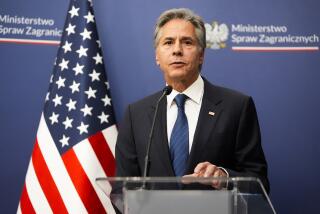Tell U.S. Story, but Openly
The United States has a good story about democracy, free markets, individual rights. U.S. embassies should be telling it loudly abroad, their voices amplified by U.S.-financed broadcasting operations like Radio Free Europe and Radio Liberty.
The way not to tell it is by surreptitiously putting foreign journalists on the CIA or the Defense Department payroll. That taints the information and imperils reputations and lives when the payoffs become known, as they eventually do. Yet the Pentagon, for the second time in a little over a year, is reported to be debating secret propaganda operations in friendly or neutral nations.
In November 2001, the Defense Department established the Office of Strategic Influence. It supposedly would concentrate on influencing foreign media to counteract lies spread by hostile governments and individuals on outlets like Al Jazeera, the newly powerful Middle Eastern radio and television operation favored by Osama bin Laden for his statements.
Although Defense Secretary Donald H. Rumsfeld said the Pentagon itself would not lie, other officers said the new office also proposed spreading false information to foreign journalists as a means of furthering the U.S. war on terrorism. (The CIA agreed in 1977 not to hire U.S. reporters to spy or disguise its operatives as reporters.) The office shut down in February after waves of criticism. Clearing out the desks seems not to have erased the idea.
Of course, wartime “disinformation” has a long history, most notably the successful attempt to convince Nazi Germany that the D-Day invasion of Europe would start somewhere other than Normandy. But keeping a tight lid on military operations or feinting about where they will occur is a far cry from trying in peacetime to psychologically influence allies and hide the government’s role. Even worse is taking the next step beyond clandestinely paying foreign journalists to favor the United States: planting outright lies. In the age of global information, 24-hour newscasts and the Internet, false stories quickly boomerang to their point of origin.
When foreign journalists are exposed as U.S. agents, suspicion falls on U.S. reporters in other countries as well. That impedes their efforts to get untainted information and makes them targets for radicals eager to kill a U.S. agent.
The United States should tell its story. When the United States Information Agency was independent, it fought to keep libraries and information centers open, spreading its message far and wide. The State Department, always uncomfortable with that independence and sometimes preferring not to upset host countries, absorbed the USIA three years ago. Financing libraries overseas, even schools, is fine. Just identify them as U.S. creations. Tell the American story, the good and the bad, and depend on the truth to be persuasive.
More to Read
Sign up for Essential California
The most important California stories and recommendations in your inbox every morning.
You may occasionally receive promotional content from the Los Angeles Times.










